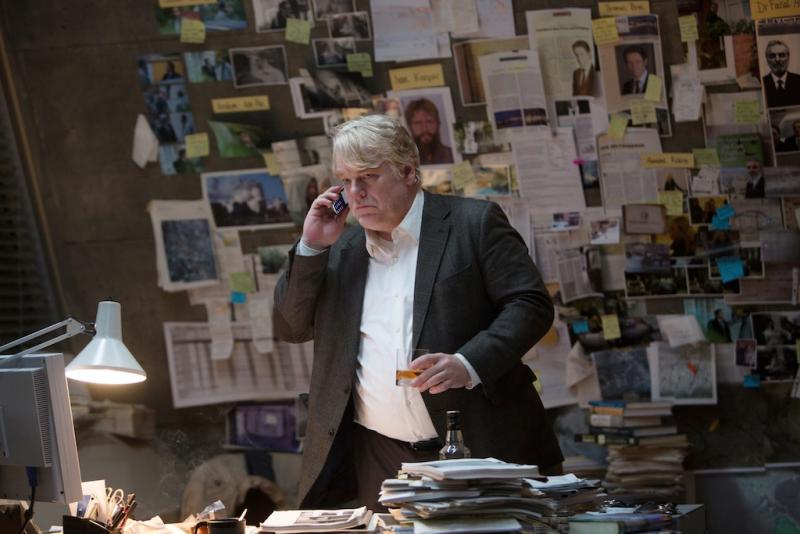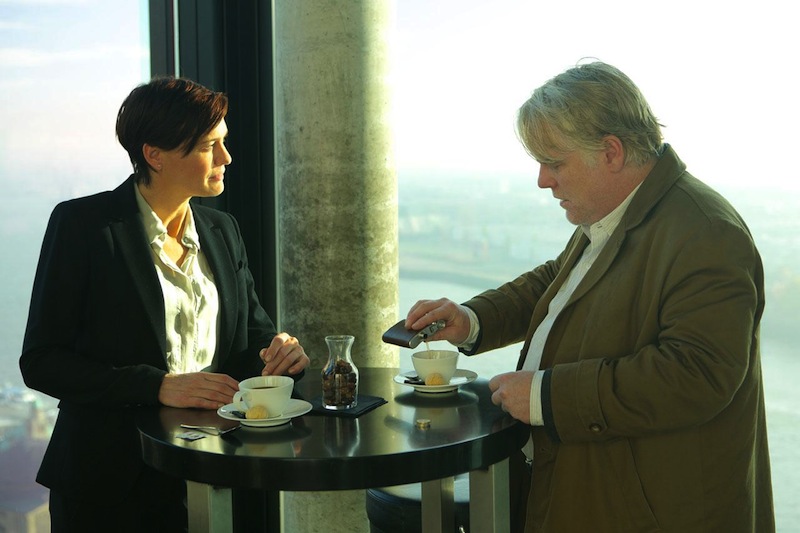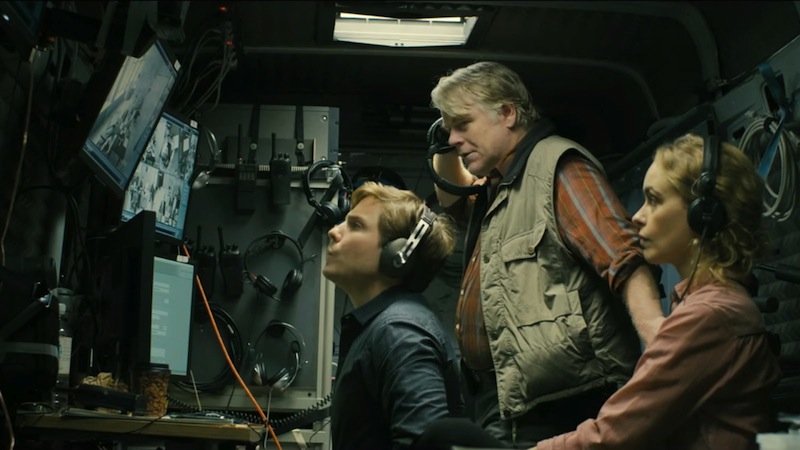A Most Wanted Man | reviews, news & interviews
A Most Wanted Man
A Most Wanted Man
Philip Seymour Hoffman brings another le Carré spy vividly to life

Other films have been and still will be released featuring Philip Seymour Hoffman, since his death earlier this year. But A Most Wanted Man is the one that serves as the final testament to what’s been lost. Here is not just a final great performance, but a character one might otherwise have imagined revisiting.
That character is Gunter Bachman, created by John Le Carré in his 2008 spy novel, who compares with George Smiley as a skilled and honourable spy, swimming against the tide of more treacherous peers.
Bachman is the head of a highly secretive German counter-terrorism unit based in Hamburg, whose modus operandi is to cultivate sources within the city’s Islamic community. This is the city where the 9/11 bombers lived and plotted, and left a toxic hole of guilt and paranoia, meaning that Bachman is constantly at odds with his country’s domestic security forces.
When a filthy, heavily-bearded man climbs out of the river Elbe and enters the city, he quickly hits the radar of Bachman’s talented young team and identified as a Chechen and militant Jihadist, Issa Karpov (Grigory Dobrygin). At first, there’s no doubt that he means ill.
As one expects from le Carré, this is a cerebral spy yarn heavy on actual spying Bachman decides to keep an eye on Karpov in the hope that he will lead him to bigger fish; in particular, the spy thinks this may be his chance to nab a moderate Muslim academic who he believes to be channelling money to terrorists. But while Bachman is playing the long game, the security service just wants to arrest Karpov and be done with it. CIA agent Martha Sullivan (Robin Wright, pictured below, with Hoffman) lurks in the wings, asking for some quid pro quo from Bachman before offering her support. Unfortunately, he has no love for the CIA; given what we’ve seen of American agents in 24, Homeland and the Bourne movies, not even able to trust each other, who can blame him?
Meanwhile, Karpov’s intentions become harder to gauge when he hires a civil rights lawyer (Rachel McAdams), asking her to approach an English banker in Hamburg (Willem Dafoe) with an unusual request.
 As one expects from le Carré, this is a cerebral spy yarn heavy on actual spying – surveillance, skulduggery, cajoling and negotiating, waiting – rather than action. And director Anton Corbijn thoroughly appreciates what he has in his hands, running his story in a matter-of-fact, low-key tone, briskly and deliberately, never pushing the intrigue but ensuring that the plot is very hard to call until the final sequence.
As one expects from le Carré, this is a cerebral spy yarn heavy on actual spying – surveillance, skulduggery, cajoling and negotiating, waiting – rather than action. And director Anton Corbijn thoroughly appreciates what he has in his hands, running his story in a matter-of-fact, low-key tone, briskly and deliberately, never pushing the intrigue but ensuring that the plot is very hard to call until the final sequence.
Corbijn’s last film, The American, which featured George Clooney as an assassin in hiding, was of a dry, existential bent; we had to work hard to find the humanity beneath its beautiful veneer. But with this film there is an abundance of flesh and blood.
A number of these protagonists are trying to put right the sins of their fathers, another is rebelling against her background, Bachman himself has demons to deal with from his previous assignment, in Beirut. Following his characters on the streets and in seedy bars, in rundown tenements and hi-tech office buildings, Corbijn builds a palpable world of displaced people – spies and suspects alike – struggling for meaning and acceptance in a city that isn’t at all welcoming.
 Bachman is central to many of the dynamics, whether nurturing or cajoling his contacts, coercing the banker and lawyer to do his bidding, playing politics, or – the lightest aspect of the film – providing the leadership and inspiration to his team (including Nina Hoss and Daniel Brühl, pictured left with Hoffman). And though the whole cast delivers, it’s Hoffman’s show.
Bachman is central to many of the dynamics, whether nurturing or cajoling his contacts, coercing the banker and lawyer to do his bidding, playing politics, or – the lightest aspect of the film – providing the leadership and inspiration to his team (including Nina Hoss and Daniel Brühl, pictured left with Hoffman). And though the whole cast delivers, it’s Hoffman’s show.
He makes a wonderfully human spymaster, able and determined, touchy-feely when he needs to be but fiery towards those he detests, so focused that when he smiles it seems like a calculated expense of energy. Physically, he’s a mess – pale, dishevelled, chain-smoking, possibly an alcoholic. One of the great things about Hoffman was his complete lack of vanity; there’s a marvellous scene here in which Bachman walks down the street struggling to tuck his shirt into his trousers, when his gut simply won’t allow it.
Somehow Hoffman manages to create a man of iron resolve, who nevertheless carries the vulnerability of knowing that he has failed before. That’s what makes the whole film absorbing and the final scenes so unbearably tense.
Overleaf: watch the trailer for A Most Wanted Man
The future of Arts Journalism
You can stop theartsdesk.com closing!
We urgently need financing to survive. Our fundraising drive has thus far raised £49,000 but we need to reach £100,000 or we will be forced to close. Please contribute here: https://gofund.me/c3f6033d
And if you can forward this information to anyone who might assist, we’d be grateful.

Subscribe to theartsdesk.com
Thank you for continuing to read our work on theartsdesk.com. For unlimited access to every article in its entirety, including our archive of more than 15,000 pieces, we're asking for £5 per month or £40 per year. We feel it's a very good deal, and hope you do too.
To take a subscription now simply click here.
And if you're looking for that extra gift for a friend or family member, why not treat them to a theartsdesk.com gift subscription?
more Film
 Can I get a Witness? review - time to die before you get old
Ann Marie Fleming directs Sandra Oh in dystopian fantasy that fails to ignite
Can I get a Witness? review - time to die before you get old
Ann Marie Fleming directs Sandra Oh in dystopian fantasy that fails to ignite
 Happyend review - the kids are never alright
In this futuristic blackboard jungle everything is a bit too manicured
Happyend review - the kids are never alright
In this futuristic blackboard jungle everything is a bit too manicured
 Robert Redford (1936-2025)
The star was more admired within the screen trade than by the critics
Robert Redford (1936-2025)
The star was more admired within the screen trade than by the critics
 Blu-ray: The Sons of Great Bear
DEFA's first 'Red Western': a revisionist take on colonial expansion
Blu-ray: The Sons of Great Bear
DEFA's first 'Red Western': a revisionist take on colonial expansion
 Spinal Tap II: The End Continues review - comedy rock band fails to revive past glories
Belated satirical sequel runs out of gas
Spinal Tap II: The End Continues review - comedy rock band fails to revive past glories
Belated satirical sequel runs out of gas
 Downton Abbey: The Grand Finale review - an attemptedly elegiac final chapter haunted by its past
Noel Coward is a welcome visitor to the insular world of the hit series
Downton Abbey: The Grand Finale review - an attemptedly elegiac final chapter haunted by its past
Noel Coward is a welcome visitor to the insular world of the hit series
 Islands review - sunshine noir serves an ace
Sam Riley is the holiday resort tennis pro in over his head
Islands review - sunshine noir serves an ace
Sam Riley is the holiday resort tennis pro in over his head
 theartsdesk Q&A: actor Sam Riley on playing a washed-up loner in the thriller 'Islands'
The actor discusses his love of self-destructive characters and the problem with fame
theartsdesk Q&A: actor Sam Riley on playing a washed-up loner in the thriller 'Islands'
The actor discusses his love of self-destructive characters and the problem with fame
 Honey Don’t! review - film noir in the bright sun
A Coen brother with a blood-simple gumshoe caper
Honey Don’t! review - film noir in the bright sun
A Coen brother with a blood-simple gumshoe caper
 The Courageous review - Ophélia Kolb excels as a single mother on the edge
Jasmin Gordon's directorial debut features strong performances but leaves too much unexplained
The Courageous review - Ophélia Kolb excels as a single mother on the edge
Jasmin Gordon's directorial debut features strong performances but leaves too much unexplained
 Blu-ray: The Graduate
Post #MeToo, can Mike Nichols' second feature still lay claim to Classic Film status?
Blu-ray: The Graduate
Post #MeToo, can Mike Nichols' second feature still lay claim to Classic Film status?

Add comment